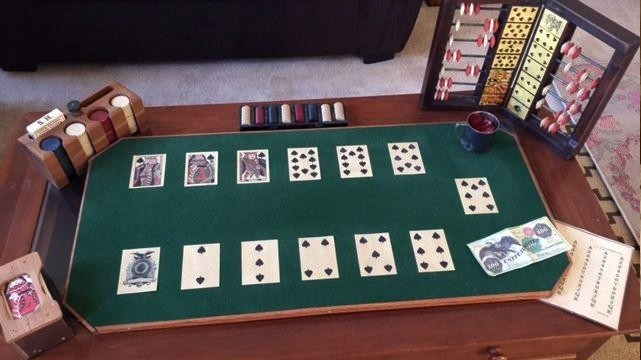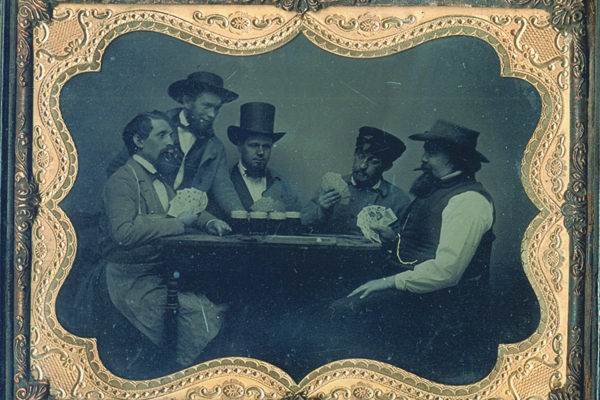Faro Gambling
Faro was by far the most popular and prolific game played in Old West saloons, followed by Brag, Three-card-monte, and dice games such as High-low, Chuck-a-luck, and Grand hazard. It was also about this time that gambling began to invite more diversity including Hispanics, blacks, Chinese. Faro was a casino card game but it was played in a manner quite different from any of the common gambling games available today. Faro was a “banking” game in which any number of players could play against the dealer or the house, referred to as. Jim Ross has been making and selling 'Faro' boards for six years now. Faro is a gambling game popular in the old west of the 1880's. If interested in this.
Also found in: Thesaurus, Acronyms, Encyclopedia, Wikipedia.far·o
faro
(ˈfɛərəʊ) nFaro
 (ˈfɑːrəʊ) n
(ˈfɑːrəʊ) nFaro Game For Sale
far•o
(ˈfɛər oʊ)n.
| Noun | 1. | faro - a card game in which players bet against the dealer on the cards he will draw from a dealing box card game, cards - a game played with playing cards |
faro

Want to thank TFD for its existence? Tell a friend about us, add a link to this page, or visit the webmaster's page for free fun content.
 Link to this page:
Link to this page: Faro flourished in the casino houses of America and parts of Europe between the 1800 and 1900s. Now, it’s a long-lost pastime that remains firmly cemented in the obituaries of gambling history. You won’t find the game in any modern-day casino, nor are there many online versions available. But why exactly did this once-so-popular casino game lose its credibility, and why did Faro enthusiasts suddenly lose interest in playing?
Faro: In the Beginning
Faro was first established in 17th century southwest France. The game was originally a spin-off of an older French card game known as Pharaon or “Pharaoh” as the French pronounced it. Pharaon was the predecessor of another popular card game called Basset, which, together with Pharaon was later banned during the reign of King Louis XIV.
Even though the game was outlawed in France at the time, it still circulated the underground gambling dens of Europe up until the 18th century. The Brits were one of the first nations to fully embrace the game, after being allured by its simplistic gameplay and easy-to-grasp rules. This was also when its name became shortened to the English alternative, Pharo, and the time when it started to gain traction in regions like Prussia (pre Germany and Poland), where a simplified version was created and dubbed Deutsches Pharao, “German Pharah.”
Faro Hits America
At the turn of the 19th century, the game had reached the north west parts of the U.S. and saw its name changed yet again to the current and most-widely used spelling, “Faro.” The Americans also referred to the game as “bucking the tiger” or “twisting the tiger’s tail” due to the pictures of a Bengal tiger that used to be displayed on the old card packs. The tiger became so symbolic that casinos and gambling dens would hang a picture of a Bengal in the window to let players know they were hosting the game there.
By 1825, Faro had become the most popular form of gambling in the Old West and could be played in more than 150 gambling halls in Washington D.C. alone. In terms of how much money was wagered in the states each year, studies showed that Faro had outshone all other table games by the mid-19th century, including classics like roulette and blackjack. Despite the initial success, however, the hype around the game would be short-lived.
The Cheating Conspiracy
Casinos thrived on the revenues and influx of visitors Faro attracted to their establishments, but the game also came under heavy criticism for being rife with scams, cheaters, and a rapid rise in gambling addiction. The worst of which was down to the casinos themselves rigging the shoes in their own favor, removing chips, and stacking the decks.
Although the operators were prosecuted eventually, irrevocable damage had been caused to the game’s reputation. Faro players were left with a bad taste in their mouths, and never truly knew if they were gambling a fair game. This led to a complete loss of interest by the time WWII broke out, and the few places the game could be found in at that point were gambling hot spots like Reno and Las Vegas.
Casinos Drop the Game
Somehow, Faro managed to survive another 50 or so years before it was eliminated from casino floors completely. Even though governing bodies monitored and regulated casinos, and despite it being near enough impossible to cheat on the game, the dawn of poker in casinos brought with it an insatiable demand for different card-playing games.
Traditional poker was already a well-established game and had been growing in popularity since it emerged in the 1800s. Once video poker machines were installed in casinos around the 1980s, however, this was pretty much the nail in the coffin for Faro, and a few years later the game had been forgotten from the minds of gamblers completely.
How to Play Faro
Faro is a basic game that works with a standard 52-card deck. Players use chips to place their bets on one card of their choice, with the objective of drawing a winning card of the same value, i.e., if the player puts money on a queen, they are hoping that they will draw a queen to add to their collection. Bets are placed before each round, and one or several cards can be bet per round.
The game starts with the dealer shuffling the deck, then placing all 52 cards into a shoe, also called a “dealing box.” The first card, known as the “soda card,” is removed from the deck first and discarded. The dealer then draws two additional cards — the first is for the banker and the second is for the player.
Bets placed on the banker card lose automatically. This means that if there was a bet on 4 for the banker’s card, for example, then the house wins all of the bets that were placed on this card. Any bets placed on the player’s hand will automatically get a payout of 1:1 if the winning card is drawn. This means if a player’s card is a 7, any wagers placed on this card will see an even payout.
Faro In Gambling
You also have the option to wager on high cards as well, meaning if the player’s card is higher than the value of the banker’s — you also win the bet. Outside bets remaining on the board are pushed onto the next round to place on the same card, a different card, or removed from the board altogether.
Conclusion
Faro Board For Sale
There’s been a few games that have seen instances of the house cheating players in the past, but no games will ever be quite as bitterly resented as Faro. This hasn’t stopped it from being referenced in TV series like Deadwood, games like Assassin’s Creed, or being portrayed in different forms of pop culture today, albeit, it’s continuously associated with being a game of crooks, thugs, and murderous cheats.



